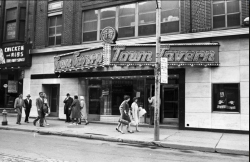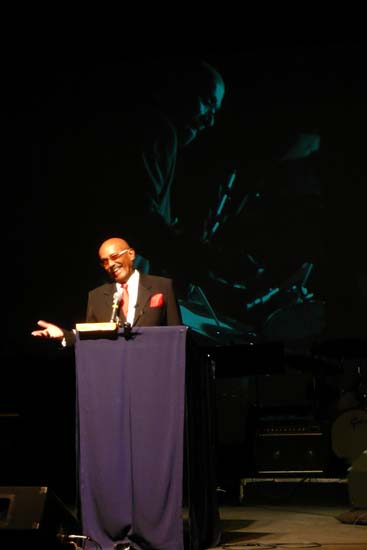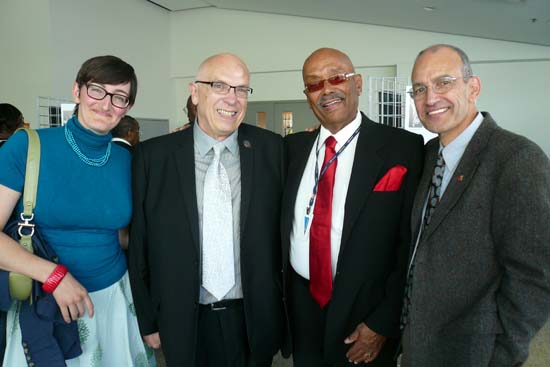
The star attraction was not in the house that night. While many others were present – the luminaries of the Canadian jazz scene – perhaps the country’s best studio and jazz concert drummer of the day was absent. In fact, it was because he was absent, that all the stars came out. It was 45 years ago that Toronto-born drummer Archie Alleyne suffered serious injuries in a car accident. He was not able to work … at either of his jobs.
“I didn’t have a car, so I had to carry my drum kit on streetcars and the subway,” he told my father, Alex Barris, back then. “I’d play from nine at night to one a.m., get home with my drums by three a.m. and be up four hours later to go to my day job.”
At any rate, as I say, back in ’67 the jazz stars came out to shine at a downtown Toronto club, the Town Tavern, in a fundraiser for Archie Alleyne. The evening’s benefit attracted a who’s who of jazz – performers such as Oscar Peterson, Peter Appleyard, Rob McConnell, Guido Basso, Ed Bickert, Norm Amadio, Arnie Chycoski and actor/singer Don Francks.
They all played for nothing that night to help raise funds for one of their own when he needed them and the funds the most. I know this, because I was there. Underage, but I was there. (Since my dad regularly covered jazz acts at the Town Tavern for the Toronto newspapers, the tavern owner allowed Alex’s 18-year-old son to sit in the shadows at the back of the tavern to hear the crème de la crème of Canadian jazz).
I never forgot it. Neither, it seems, did Archie Alleyne.

Last weekend, the 78-year-old legend hosted a show called “Syncopation: Life in the Key of Black” at the Al Green Theatre at Spadina and Bloor. It was his seventh annual fundraising concert to provide 17 scholarships to up-and-coming jazz musicians in the GTA – he calls it the Archie Alleyne Scholarship Fund. More than that, the event put many of those same musicians and performers – the Evolution of Jazz Ensemble, and dancers Shawn Byfield and Janaye Upshaw – in front of an appreciative audience. As Archie put it:
“Support of young musicians will have a positive impact on the future of live jazz music in this country.”
Clearly, Archie enjoyed the same kind of support and returned the favour on stage to the likes of Billie Holiday, Nancy Wilson, Joe Williams, Mel Torme, Big Joe Turner, Carmen McRae and Nina Simone. In the 1950s and ’60s, I remember my father writing often about this drummer who was a regular at the Colonial Tavern and the Town Tavern. He retold a touching Billie Holiday story.
“She came to sing at the Stratford Festival,” Archie said, “when they started staging jazz there, and I was accompanying. After that, she came to the Town Tavern for a week. It could be a noisy room, but I remember one night when she just silenced the place. Even the kitchen staff stopped work and came out to listen to her sing. I’ve never known anything quite like it. That was less than three years before she died.”
This illustrates that all his life, Archie Alleyne has given his musical art form something most musicians have not – an archive. Some of it he has lived. Some he has gathered and catalogued. Alleyne recalls his first paying gig in 1949, when he earned $3 for playing in a church basement. He was among the first African-Canadian musicians to get regular work in a Toronto era when there were still “whites only” lounges and bars. And to pay tribute to his heritage, Archie Alleyne has documented and preserved his musical history and the careers of his black contemporaries, such as Cy McLean, Phyllis Marshall, Betty Willis, Frank Wright, Syd Blackwood, Vernon Isaac, Wray Downes and bands such as the Harlem Aces and Mr. Leonard’s Troop.

“Jazz,” he told my dad, “is black classical music” and needs to be preserved.
Archie Alleyne likes to remind his benefactors and beneficiaries that, “without the past, there is no future.” But while remembering the gifts and encouragement one has received along the way, I think – as Archie Alleyne has proven – it’s important to document that legacy too.